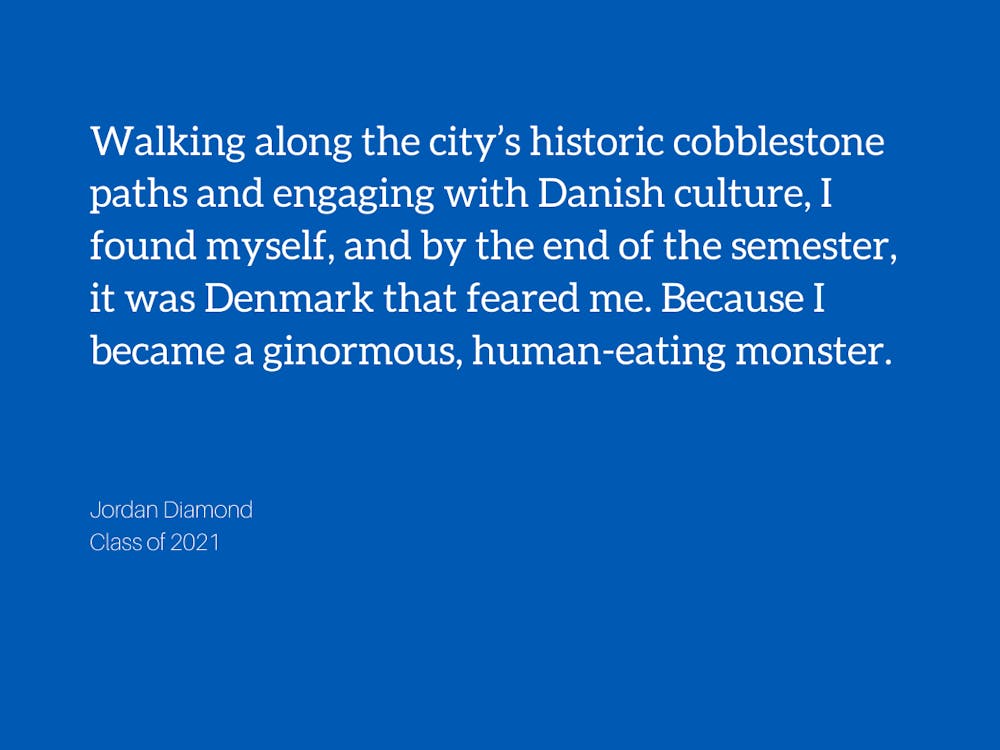This past semester, I studied in Copenhagen, Denmark. I was scared heading in—what if I couldn’t make any friends, or felt too homesick? But walking along the city’s historic cobblestone paths and engaging with Danish culture, I found myself, and by the end of the semester, it was Denmark that feared me. Because I became a ginormous, human-eating monster.
My semester started off unassuming. I met some nice students in my kollegium (Danish dormitory for college students), and tried some local pastries. I swam in the canals, basking in the sun before the weather got too cold. I even picked up some Danish, like hej (hello) and mange tak (thank you very much). One night, about a month into the semester at a dance club in the Meatpacking District, I met a Russian scientist who injected my thigh with a green serum. Look at me, making friends from all over the world! Over the next few days, I grew to 300 meters tall (that’s 985 feet, for the Americans). After that point, the only Danish I picked up was hjælp! (help) and red mig! (save me).
Unlike a normal semester at Duke, studying abroad isn’t all about the classes. Sure, I took a fascinating course on European art history and a great creative writing class, but most of my learning last semester took place in museums, in broken English conversations with strangers about our cultural differences, and over massive footsteps across European countrysides that destroyed farmlands, vineyards and ancestral homes alike. One cultural difference I picked up on quickly is that Europeans generally dislike the demolition of their private property, even if by accident. How exotic!
Yes, study abroad changed me. I flew into Copenhagen from New York nervous and uninformed about the world. I left Denmark by trampling into Germany and then France and over the Atlantic Ocean back to North America in a daring leap with a body covered in green scales and sharp teeth that can break through any building or bone. Do I feel more cultured after touring through Europe? Yes, absolutely. Have I terrorized villages, and razed cities? Also, yes.
I recognize some privilege in being able to study abroad. Not everyone can fit a semester at another university into their schedules, and not everyone can afford the costs of spending a semester in another country, either. There’s probably also some privilege in being a hideously enormous and destructive monster—when I traveled to Paris, for example, my view of the Eiffel Tower was unobstructed, until I fell into rage at the shouting Parisians, grabbed their beloved monument, and used it to impale all that stood in my way. But I really didn’t feel too privileged when the member states of NATO promised to free their citizens of my reign and set their militaries towards me, with the intention of utilizing their collective artilleries to defeat me and then research my genetics for weapons development in an underground laboratory. Those missiles really irritated my skin on impact, but of course, could not so much as pierce it.
Some may be tempted to read my tale as an allegory for the exploitative nature of travel, or a satire of students’ attempts to find deeper meaning in limited interactions with foreign places. Does the “monster” symbolize globalization, and the destruction its effect on the sanctity of culture? Is the “monster” instead American ignorance, whose tourist gaze carries the ginormous legacy of American imperialism with it? Well, as a journalist, not reporting the truth would be an abdication of my responsibility to the Duke Chronicle’s readership, and my truth is that I fear my condition is continuing to deteriorate. Driven by my intense loneliness, I crave the taste of human flesh, and must consume that species which cowers and shrieks as I approach it. My uncontested dominance over humanity is the only way I can be appeased in my current form.
I know I’ll be back to Copenhagen one day, because the city has shaped who I am today. I miss the coffee shops where I worked on homework, all the smørrebrød (Danish open-faced sandwiches) I tried, and even the royal palace I accidentally crushed with one misplaced step. I hope that next time I find myself in Denmark, I am free of my monstrous body and can enjoy the city as a normal tourist. Until then, I will live my life in isolation, obliterating all before me, until the world’s scientists discover a cure.
Jordan Diamond is a Trinity junior. His column, “diamond in the rough,” runs on alternate Tuesdays.
Get The Chronicle straight to your inbox
Signup for our weekly newsletter. Cancel at any time.

